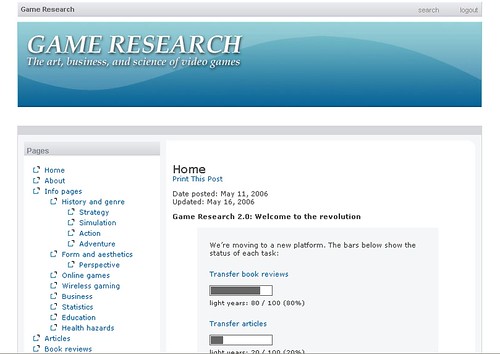Nordic Game 2006 – Research Program – Open Call
Call for presenters for an academic symposium “Understanding the Player” at
Nordic Game 2006. 19-20 September. Malmö, Sweden.
Nordic Game 2006 – Research Program – Open Call
Call for presenters for an academic symposium “Understanding the Player” at
Nordic Game 2006. 19-20 September. Malmö, Sweden.
The ESA has an interesting overview of research which they happen to agree with, i.e. research which questions the games->aggression idea. Unbiased it is not, but hey…

I’m tweaking WordPress to work as a CMS for www.game-research.com. Updating the old thing has been just too difficult – and so nothing will stand in the way of new content (of which various things are planned).
If you wish to contribute to the site – in the form of a book review etc. – let me know.
The new version is visible at www.game-research.com/2.
Comments? Suggestions? (Put ’em here).

I’m late to the party, but let it be widely known among all readers of this blog that my supervisor, TL Taylor’s book Play Between Worlds is out in the wild. I’m sure it’s excellent and I’m looking forward to reading it.
From the description:
In Play Between Worlds, T. L. Taylor examines multiplayer gaming life as it is lived on the borders, in the gaps–as players slip in and out of complex social networks that cross online and offline space. Taylor questions the common assumption that playing computer games is an isolating and alienating activity indulged in by solitary teenage boys. Massively multiplayer online games (MMOGs), in which thousands of players participate in a virtual game world in real time, are in fact actively designed for sociability. Games like the popular Everquest, she argues, are fundamentally social spaces.
Taylor’s detailed look at Everquest offers a snapshot of multiplayer culture. Drawing on her own experience as an Everquest player (as a female Gnome Necromancer)–including her attendance at an Everquest Fan Faire, with its blurring of online-and offline life–and extensive research, Taylor not only shows us something about games but raises broader cultural issues. She considers “power gamers,” who play in ways that seem closer to work, and examines our underlying notions of what constitutes play–and why play sometimes feels like work and may even be painful, repetitive, and boring. She looks at the women who play Everquest and finds they don’t fit the narrow stereotype of women gamers, which may cast into doubt our standardized and preconceived ideas of femininity. And she explores the questions of who owns game space–what happens when emergent player culture confronts the major corporation behind the game.
Full papers, no abstracts this time. This is quite an interesting development as it will include fields in which only full papers count as worthy (the case for many computer scientists).
The announcement:
DiGRA 2007 First Circular
We, the DiGRA 2007 Local Organizing Committee, are happy to announce
that the third DiGRA (Digital Games Research Association)
international conference will be held in Tokyo, Japan in September
2007. Scholars of digital games from around the world are encouraged
to submit a paper and to participate in the conference. Held in the
world capital of videogames, this conference will be an event that no
game studies scholar can afford to miss. We are working hard for
DiGRA 2007 to be truly special.
The theme of this conference is “Situated Play.” Game play does not
take place in vacuum. For play to be possible, certain social,
cultural, economic, and technological conditions need to converge.
Digital games, therefore, require truly diverse approaches to
illuminate their extremely multi-faceted nature. The goal of this
conference is to shed more light on these various kinds of
situatedness of games. In particular, the conference aims to bridge
professionally and geographically diverse scholars and practitioners.
We therefore welcome panel proposals and papers that describe various
facets regarding the situatedness of digital games and attempt to
combine a range of approaches in innovative ways.
For our participants’ convenience, the dates of the conference will be
set close to the Tokyo Game Show so that participants can take
advantage of both events. The selection of papers will be based on
full papers instead of abstracts, and the deadline will be in February
2007. A second circular revealing more details about DiGRA 2007 will
be issued in late May or early July.
We hope to see you in Tokyo!
– DiGRA 2007 Local Organizing Committee
Akira Baba (Chair), Kiyoshi Shin, Akinori Nakamura, Kenji Ito